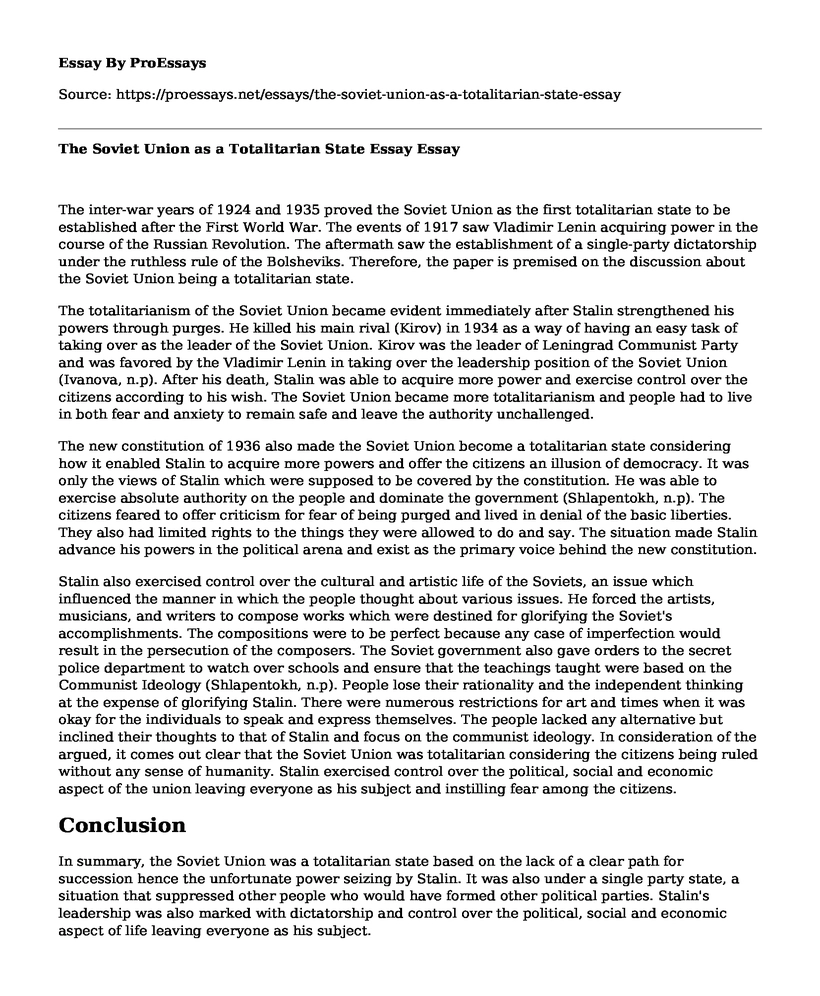The inter-war years of 1924 and 1935 proved the Soviet Union as the first totalitarian state to be established after the First World War. The events of 1917 saw Vladimir Lenin acquiring power in the course of the Russian Revolution. The aftermath saw the establishment of a single-party dictatorship under the ruthless rule of the Bolsheviks. Therefore, the paper is premised on the discussion about the Soviet Union being a totalitarian state.
The totalitarianism of the Soviet Union became evident immediately after Stalin strengthened his powers through purges. He killed his main rival (Kirov) in 1934 as a way of having an easy task of taking over as the leader of the Soviet Union. Kirov was the leader of Leningrad Communist Party and was favored by the Vladimir Lenin in taking over the leadership position of the Soviet Union (Ivanova, n.p). After his death, Stalin was able to acquire more power and exercise control over the citizens according to his wish. The Soviet Union became more totalitarianism and people had to live in both fear and anxiety to remain safe and leave the authority unchallenged.
The new constitution of 1936 also made the Soviet Union become a totalitarian state considering how it enabled Stalin to acquire more powers and offer the citizens an illusion of democracy. It was only the views of Stalin which were supposed to be covered by the constitution. He was able to exercise absolute authority on the people and dominate the government (Shlapentokh, n.p). The citizens feared to offer criticism for fear of being purged and lived in denial of the basic liberties. They also had limited rights to the things they were allowed to do and say. The situation made Stalin advance his powers in the political arena and exist as the primary voice behind the new constitution.
Stalin also exercised control over the cultural and artistic life of the Soviets, an issue which influenced the manner in which the people thought about various issues. He forced the artists, musicians, and writers to compose works which were destined for glorifying the Soviet's accomplishments. The compositions were to be perfect because any case of imperfection would result in the persecution of the composers. The Soviet government also gave orders to the secret police department to watch over schools and ensure that the teachings taught were based on the Communist Ideology (Shlapentokh, n.p). People lose their rationality and the independent thinking at the expense of glorifying Stalin. There were numerous restrictions for art and times when it was okay for the individuals to speak and express themselves. The people lacked any alternative but inclined their thoughts to that of Stalin and focus on the communist ideology. In consideration of the argued, it comes out clear that the Soviet Union was totalitarian considering the citizens being ruled without any sense of humanity. Stalin exercised control over the political, social and economic aspect of the union leaving everyone as his subject and instilling fear among the citizens.
Conclusion
In summary, the Soviet Union was a totalitarian state based on the lack of a clear path for succession hence the unfortunate power seizing by Stalin. It was also under a single party state, a situation that suppressed other people who would have formed other political parties. Stalin's leadership was also marked with dictatorship and control over the political, social and economic aspect of life leaving everyone as his subject.
Works Cited
Ivanova, Galina Mikhailovna, et al. Labor Camp Socialism: The Gulag in the Soviet Totalitarian System: The Gulag in the Soviet Totalitarian System. Routledge, 2015.
Shlapentokh, Vladimir. A normal totalitarian society: how the Soviet Union functioned and how it collapsed. Routledge, 2017.
Cite this page
The Soviet Union as a Totalitarian State Essay. (2022, May 09). Retrieved from https://proessays.net/essays/the-soviet-union-as-a-totalitarian-state-essay
If you are the original author of this essay and no longer wish to have it published on the ProEssays website, please click below to request its removal:
- Critique of Dissent From War by Robert Ivie Essay
- The Use of Comic in World War II Essay
- Conservatism and Liberalism Essay
- Literary Analysis Essay on Epistle 1.8 and Epistle 1.19
- The Seven Emirates of the UAE: Autonomy, History & Sovereignty
- Essay Example on Richard Wagner: A Life Journey Explored
- Essay Example on Nationalism: A Political and Emotional Expression of Identity.







